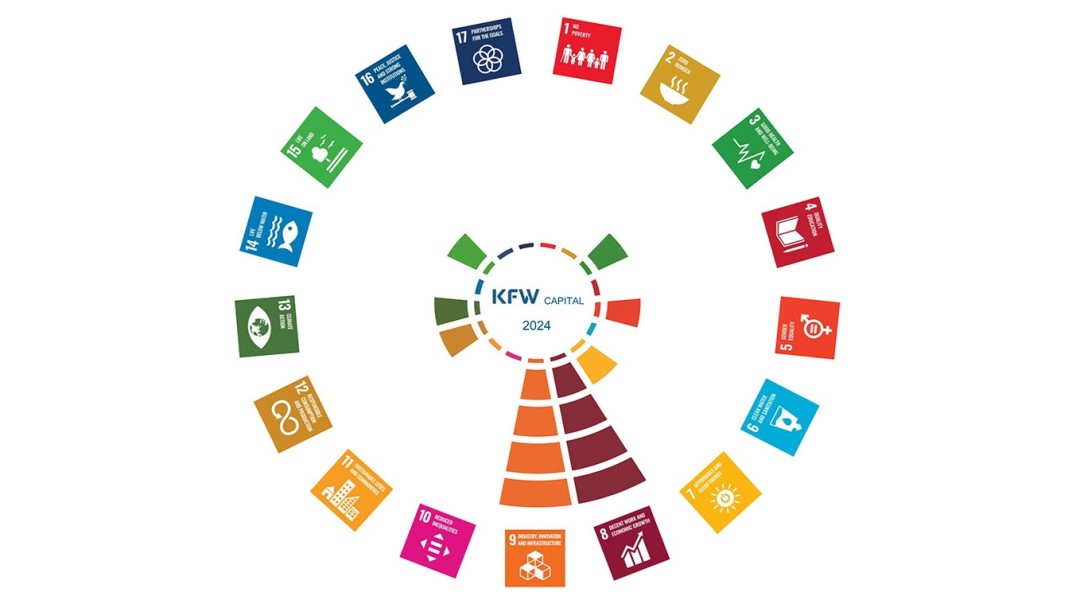Tip: Activate javascript to be able to use all functions of our website
Integrating ESG into our investment strategy is of central importance for KfW Capital. We strongly believe that managing ESG risk factors today is more than just a matter of regulatory compliance, as systematically leveraging the resulting opportunities opens up possibilities for creating the sustainable value that is essential for generating long-term returns.
VC funds play a crucial role in the foundation and growth phase of new companies, accompanying and supporting them throughout their development. We want our funds to help bring about positive change and to enable their portfolio companies to be part of the solution.
That is why an essential element of our strategy is to fully incorporate sustainability principles into our own investment processes at an early stage and, beyond that, to promote them within the VC ecosystem. In recent years, we have implemented a large number of measures, designed processes and created formats aimed at achieving this.
In 2021, KfW Capital conducted an in-depth study of the topic of ESG in the VC market together with the Boston Consulting Group, and it developed and implemented an own framework based on the findings. It was published in the report "Growing the Seeds of ESG" (Nov. 2021).
During the investment process, KfW Capital verifies the fund's compliance with the exclusion list, its regulatory compliance under the Sustainable Finance Disclosure Regulation and its ESG management capabilities. Details of KfW Capital's ESG due diligence requirements are presented in the Sustainability Policy and in the VC Information Package ESG & Impact Requirements.

KfW Capital began to request sustainbility details from its funds and their portfolio companies for the first time as of 31 December 2022. KfW Capital uses them not just for its internal portfolio monitoring but also as input for the KfW's impact management, greenhouse gas accounting and taxonomy reporting.
For the purpose of standardisation, KfW Capital has decided to use the ESG reporting template of Invest Europe (see also the ESG reporting guidelines).
For our professional ESG reporting, we are working closely together with Atlas Metrics.
KfW Capital's first ESG report can be found here.
In addition to ESG reporting, KfW Capital has the ambition to capture the impacts from investments and to report them both internally and externally in order to create more transparency in the market and, in this way, to contribute to sustainable development.
KfW has previously been using a group-wide SDG mapping with which it made the positive SDG contributions to be expected from all new commitments transparent.
The most important SDG contributions made by KfW Capital in the 2023 financial year were:

From now on, the impacts of KfW Capital will be reported as part of the group-wide impact management. As KfW is THE transformative and digital promotional bank, it is committed to systematically identifying the economic, ecological, and social impacts of its financing and promotional activities, presenting them transparently for the whole group, and developing appropriate management input to achieve greater effectiveness. At the core of this impact management system are measurable and comparable impact indicators. The impact data collected using these indicators gives transparent information to the public and stakeholders and provides KfW Group with important findings for the continuous development of its financing operations.
With its indicators, the impact management system covers all three sustainability dimensions - economic, ecological, and social - and is guided by the 2030 Agenda of the United Nations with its 17 Sustainable Development Goals (SDGs). The Methodology Paper containing detailed information on the underlying strategy offers more information about this.
As KfW Capital was founded with the mandate to invest in German and European venture capital and ventures debt funds and thereby improve the supply of capital for innovative, technology-oriented start-ups and fast-growth enterprises, the key impact categories derived from its strategy are:
These contribute primarily to SDG 8 (Decent work and economic growth) and SDG 9 (Industry, innovation and infrastructure).
In addition, financing from KfW Capital also makes a contribution to further impact categories, which we will be able to quantify in the futures using collected data.
Some of the data for the group-wide impact management is captured by KfW Capital itself, other data is acquired from the ESG reporting of the portfolio funds. The aggregated impact of the KfW Group is summarised in an annual impact report.
Further information on KfW's impact management can be found here.